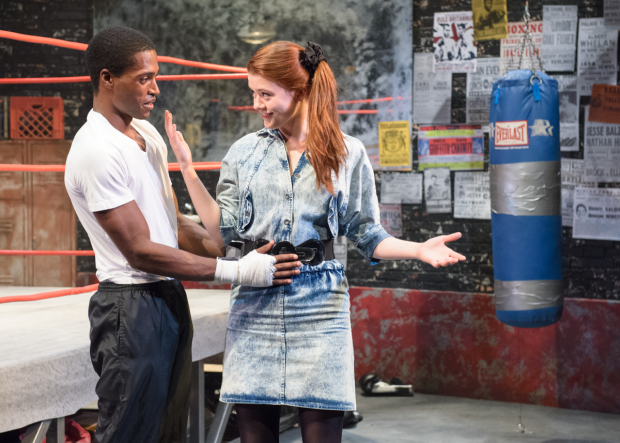Sucker Punch

(© Michael Courier)
It's been roughly five years since Roy Williams' kinetic drama Sucker Punch wowed critics at its London world premiere before crossing the ocean to Washington, D.C., for a similarly effusively reception there in 2012. Walk into the Victory Gardens' Midwest premiere of Williams' exploration of racial violence in 1980s England and audiences may have a flashback to a different show, Kristoffer Diaz's The Elaborate Entrance of Chad Deity.
As was the case with Diaz's tale of race and professional fighting, the stage for Sucker Punch has been transformed into a full-size ring. But even with strong visual and thematic cues, it's unfair to overstate the similarities between the two shows – both put the audience ringside, but they're set worlds and decades apart. Sucker Punch plays out in England during the Thatcher era. The working man is being systemically kicked while he's down, and before the decade (and the play) is over, race riots will erupt in Brixton.
A tour de force of theatrical athleticism comes toward the end of the story, which centers on two young black men, Leon (Maurice Demus) and Troy (Denzel Love). They're best friends and petty criminals who've been caught breaking into a gritty, hanging-on-by-a-nail gym owned by Charlie (John Judd). Instead of calling the cops, Charlie has the pair scrubbing the toilets and mopping floors. When a race-based altercation between a white trainee (Walter Briggs) escalates to blows, Charlie realizes Leon is championship material and begins training him.
As Leon's star ascends, his friendship with Troy deteriorates, the latter eventually going to the U.S. where he too finds success in the ring. Predictably, the two are matched against each other in the final act, and a decade's worth of complicated emotions surface as feints, uppercuts, and knockouts. Williams' escalates the intensity of Leon's successive bouts ingeniously: The initial fight is all shadow-boxing and jump-roping, the following clashes increasing in realism until that final, brutal match.
Under the athletic direction of Dexter Bullard, Sucker Punch unfolds in a series of fights in the ring as well as in the play's cultural milieu. Without some knowledge '80s British slang (the theater program provides a glossary) or a rudimentary understanding of the socioeconomic factors that sparked the Brixton Riots, some scenes may bewilder audiences. The riots are indicated only by clamorous offstage sound effects and angry onstage reactions, and actors speaking in a thickly accented vernacular render pockets of dialogue difficult to understand.
Although the specifics of the riots are muddled in Sucker Punch, the raw emotion among the characters is not. As a depiction of angry young men fighting for a fair shake among unfair odds, the show succeeds in that respect.
Bullard directs the physical action of the play superbly. He has spent the better part of the past three decades telling stories in which the movement is as nuanced and crucial as the dialogue, making him adept at telling a story so indelibly grounded in movement. In the climactic second-act match, the boxing bout plays out almost wordlessly with a clarity and naturalism that defies the phrase "fight choreography."
Bullard gets terrific, gutsy performances from the men in his cast. Demus displays a spectacular convergence of athletic and acting prowess. As Leon's father, Squid, Kenn E. Head lights up the stage with the wiliness of a natural-born hustler whose unabashed willingness to exploit his own son engenders a kind of horrified admiration. And as Troy, Love is as tough and cocky as a bantam rooster. The play also features Taylor Blim as Charlie's daughter Becky. But as appealing as Blim is, Becky is more a device for revealing the personalities of the men around her. It's through her that we learn how ingrained Charlie's own racism is (and what a bad businessman he is), and how willing Leon is to cast people aside in order to advance his own cause.
Sucker Punch's primary shortcoming is its failure to clearly show how the racial tensions and violence exploding throughout London impact everything that happens inside Charlie’s gym. The aggressions and micro-aggressions that play out in the ring are brutally evident: Charlie would rather die than see his daughter dating a black man. Leon faces a barrage of boos and bottles when he takes on a white opponent. But larger context of a world that foments such racism is murky. The London riots, Thatcher's xenophobic policies, and the police brutality that leaves an irreparable fault line between Troy and Leon are barely addressed.
By skimping on context, Sucker Punch also removes remove layers of meaning from the motivations, actions and consequences that we see onstage. There's a rich, important story in Sucker Punch. But you're apt to miss much of it in this production.











